$80,000 Awarded to Student Ventures at 2019 Dempsey Startup Competition
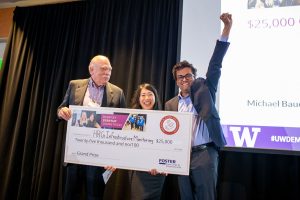 A dream of preventing bridges from crumbling and harming people inspired the grand prize-winning team at the 2019 Dempsey Startup Competition. HRG Infrastructure Monitoring took home the $25,000 Herbert B. Jones Foundation prize at the competition hosted by the UW Foster School’s Buerk Center for Entrepreneurship. The team of civil engineering PhD and business communication students from the University of Victoria combined a damage assessment algorithm with drone-based technology to detect damage in civil structures in a cost-efficient way.
A dream of preventing bridges from crumbling and harming people inspired the grand prize-winning team at the 2019 Dempsey Startup Competition. HRG Infrastructure Monitoring took home the $25,000 Herbert B. Jones Foundation prize at the competition hosted by the UW Foster School’s Buerk Center for Entrepreneurship. The team of civil engineering PhD and business communication students from the University of Victoria combined a damage assessment algorithm with drone-based technology to detect damage in civil structures in a cost-efficient way.
HRG also made history at the 22-year-old event formerly known as the UW Business Plan Competition. They won in the first year the competition was open to college and university students across the entire Cascadia Corridor—including British Columbia. The focus on making the competition not just the University of Washington’s premiere student entrepreneurship event, but the entire region’s, prompted a record 113 applications from sixteen schools including HRG from Victoria, and fellow award-winning team Zense of British Columbia (more prize details below).
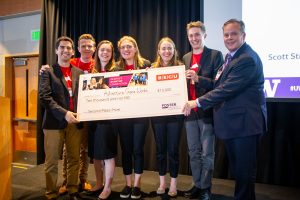 Judges awarded the $10,000 BECU second place prize to another Pacific Northwest standout—Adventure Game Works of Gonzaga University. The team of computer science, business, and marketing students were one of the few made up entirely of undergraduates. They formed an entertainment startup that creates customized, live-action game kits for families and friends that also includes a “side gig” element for customers interested in becoming a “game host” in their network.
Judges awarded the $10,000 BECU second place prize to another Pacific Northwest standout—Adventure Game Works of Gonzaga University. The team of computer science, business, and marketing students were one of the few made up entirely of undergraduates. They formed an entertainment startup that creates customized, live-action game kits for families and friends that also includes a “side gig” element for customers interested in becoming a “game host” in their network.
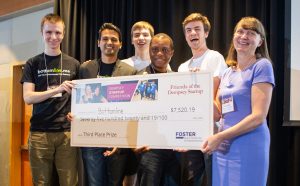 Navigating job offers was a primary focus of the $7,500 Friends of the Dempsey Startup third place prize winners Bottomline from UW. The team of computer science students developed a compensation analytics service that helps job seekers make an “apples-to-apples” comparison of offers that include salary, stock offerings, and more.
Navigating job offers was a primary focus of the $7,500 Friends of the Dempsey Startup third place prize winners Bottomline from UW. The team of computer science students developed a compensation analytics service that helps job seekers make an “apples-to-apples” comparison of offers that include salary, stock offerings, and more.
The $5,000 Fenwick & West fourth place prize went to AeroSpec from UW. The team of electrical and computer engineering students combined innovate hardware and software to create a real-time air quality monitoring system. Startup co-founder and PhD student Sep Makhsous has a history of big wins at the event. He was a senior engineer on the Pure Blue Technologies team that won the grand prize back in 2013.
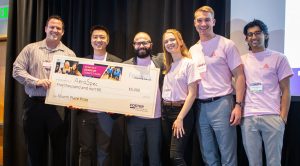 In total, more than 400 judges representing the top names in entrepreneurship, venture capital, angel investing, IP law, and more participated in the multi-stage competition, including the Top-36 Investment Round where Best Idea and Big Picture prizes were selected.
In total, more than 400 judges representing the top names in entrepreneurship, venture capital, angel investing, IP law, and more participated in the multi-stage competition, including the Top-36 Investment Round where Best Idea and Big Picture prizes were selected.
Zense of the Univ. of British Columbia won the $5,000 Glympse Internet of Things prize, which recognizes a business venture that contributes to the IoT ecosystem. Zense is a suite of passive sensors used to detect safety hazards for those with Alzheimers.
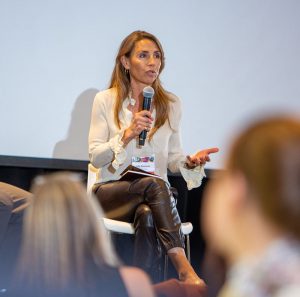 ElectroSolar Oxygen of UW won the $5,000 MOD Pizza Social Impact prize, which goes to a startup that “not only demonstrates the capacity to deliver financial performance, but also shows how it makes a positive contribution to society.” ElectroSolar Oxygen created a portable oxygen generator that can be deployed in rural medical facilities. They received the award directly from MOD Pizza co-founder Ally Svenson, who was the keynote speaker at the awards dinner. Svenson shared insights into how she and her co-founder (and husband) disrupted the pizza industry by “creating a business model built on taking risks.”
ElectroSolar Oxygen of UW won the $5,000 MOD Pizza Social Impact prize, which goes to a startup that “not only demonstrates the capacity to deliver financial performance, but also shows how it makes a positive contribution to society.” ElectroSolar Oxygen created a portable oxygen generator that can be deployed in rural medical facilities. They received the award directly from MOD Pizza co-founder Ally Svenson, who was the keynote speaker at the awards dinner. Svenson shared insights into how she and her co-founder (and husband) disrupted the pizza industry by “creating a business model built on taking risks.”
Novita from UW won the $2,500 eBay Best Marketplace Idea prize that goes to teams that create a commerce or payments platform for communities of buyers, sellers, or businesses. Novita created a software tool and online marketplace to connect senior patients and their caregivers to essential services.
Cura AI from UW won the $2,500 Cambia Grove Best Health/Healthcare Idea prize for ventures that offer new solutions or approaches to address health outcomes and/or improve the quality or efficiency of healthcare delivery. Cura AI uses machine learning technology to analyze healthcare imaging.
Averto of the Univ. of Oregon won the $2,500 DLA Piper Best Idea with Global Reach prize, for ventures that aspire to acquire customers around the world. Averto is helping people in conflict-zones access secure information about events in nearby areas.
WM Launch Services of UW won the $2,500 Perkins Coie Best Innovation/Technology prize, which recognizes a venture that has a new application for a current or disruptive technology or idea that represents a substantial improvement. WM is developing a new type of projectile that eliminates the pollution associated with space launches
Wheyward Spirit of the Univ. of Oregon won the $2,500 RealSelf Best Consumer Product Idea prize which goes to a venture that offers a compelling new consumer product, focusing on a well-defined market. Wheyward makes “farm-to-flask” spirits from excess whey.
Elixir from UW won the $2,500 Saara Romu Foundation Community Impact Prize for ventures that have a direct impact on the lives of women or other underserved communities. The team created a mobile app that connects uninsured populations with healthcare services.
NanoPrint of UW won the $2,500 David and Patty Helberg Smukowski Best Sustainable Advantage prize, which recognizes a venture that has incorporated best practices toward resource reduction while bolstering profitability and cost containment. NanoPrint created a strong composite 3-D printing material from recycled waste.
HRG Infrastructure Monitoring also won the $2,500 Voyager Capital Best Business to Business Idea prize for startups with an innovative B2B product or platform.
DopCuff of UW won the $2,500 WRF Capital Best Health/Wellness Impact prize for startups with significant potential to prevent, diagnose, or treat diseases or disorders that impact human health. DopCuff created a device to better allow nurses to obtain accurate blood pressure readings in an outpatient setting.
In the past 22 years of the competition, more than 5,000 students have participated, and 183 teams have been awarded undiluted seed funding totaling more than $1.5 million. Overall, the Buerk Center has awarded more than $3.4 million dollars to students since 1998 through multiple competitions and the Jones + Foster Accelerator.
